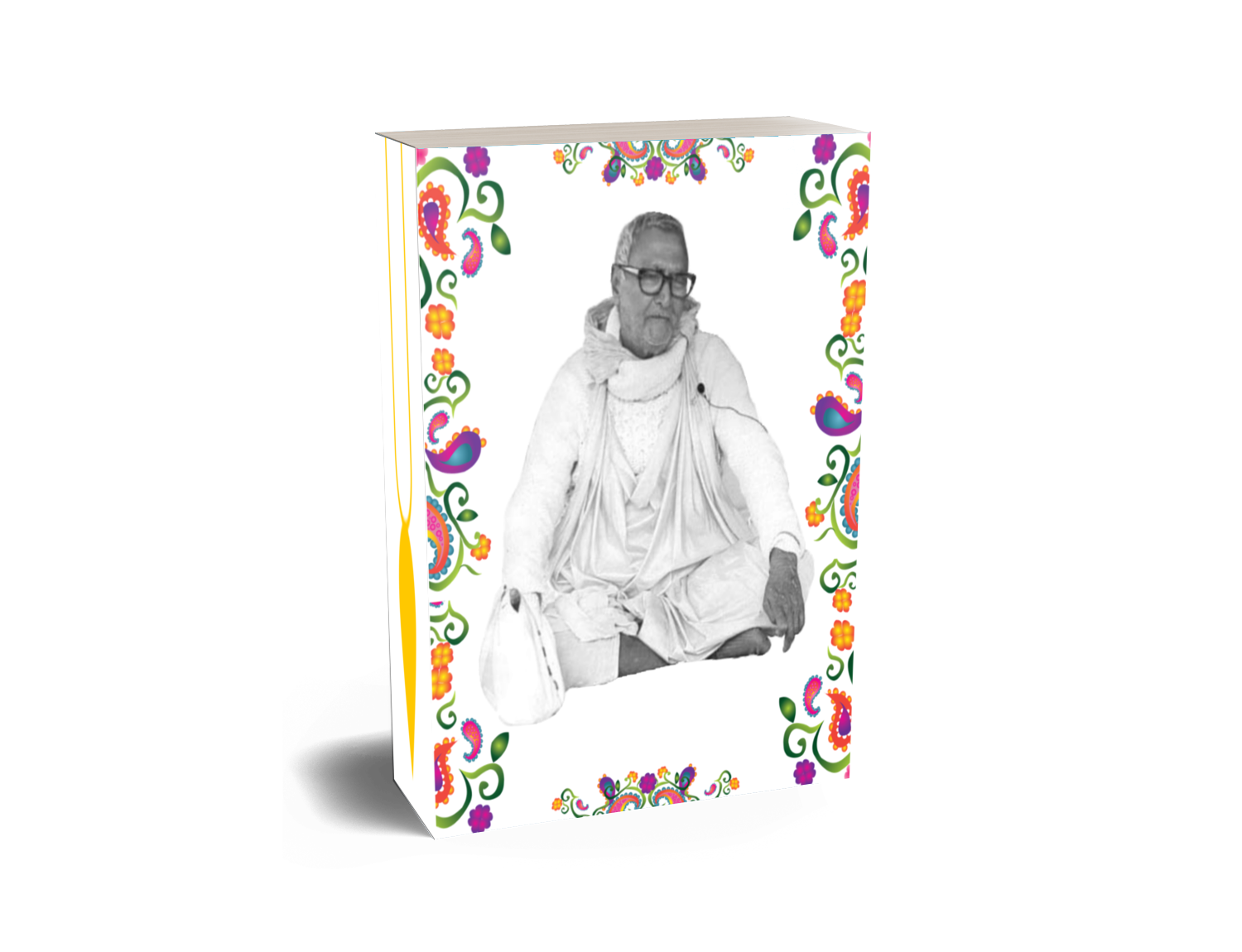

The following is an excerpt from Sermons of the Guardian of Devotion Volume 3, Chapter 5, Priority Service by Śrīla Bhakti Rakṣaka Śrīdhara Mahārāja, published on http://scsmath.org
Generally, every movement coming from Kṛṣṇa’s plane originates from the centre will to satisfy Him. The whole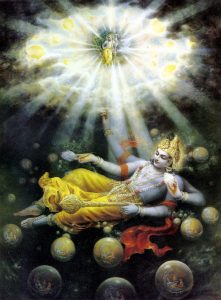 svarūpa-śakti cannot be taken under any law; it is sweet will. Yoga-māyā, or svarūpa-śakti, gives the inspiration for one to be captured by the higher inner potency of Goloka and Vaikuṇṭha and in that way to become utilised for the purpose of the Centre. In this mundane plane, inspiration draws us towards different stages of enjoying spirit. That vibration comes from innumerable local centres of local interest. Also, in the attraction to the Centre, there are many stages, but that vibration is from the Nārāyaṇa Centre, the Rāma Centre, the Kṛṣṇa Centre — all in consonance with the main Centre. In Vaikuṇṭha, there are different types of rasa and inspiration than in Goloka, and the residents act accordingly. There are also different specific centres of interest — dāsya, sakhya, vatsālya, and mādhurya — but all are for the satisfaction of the Absolute.
svarūpa-śakti cannot be taken under any law; it is sweet will. Yoga-māyā, or svarūpa-śakti, gives the inspiration for one to be captured by the higher inner potency of Goloka and Vaikuṇṭha and in that way to become utilised for the purpose of the Centre. In this mundane plane, inspiration draws us towards different stages of enjoying spirit. That vibration comes from innumerable local centres of local interest. Also, in the attraction to the Centre, there are many stages, but that vibration is from the Nārāyaṇa Centre, the Rāma Centre, the Kṛṣṇa Centre — all in consonance with the main Centre. In Vaikuṇṭha, there are different types of rasa and inspiration than in Goloka, and the residents act accordingly. There are also different specific centres of interest — dāsya, sakhya, vatsālya, and mādhurya — but all are for the satisfaction of the Absolute.
In this mundane plane, we also find different centres, but almost all are meant for local interest. All the different vibrations come to clash for different interests which are, on the whole, all of separate enjoyment. This is found in the material plane all the way up to Satyaloka, heaven. Above that are Virajā and Brahmaloka, from where no traceable vibration originates. Then again from Śivaloka onwards, some vibration originates, but that is of service. That vibration is of different stages, but all are of Centre-carrying interest.
Here in this mundane universe, those who come from the higher region always try to connect with the Centre. Some are able to escape from local interests and realise such a position. Although they may not be cent-per-cent converted, they may sometimes be used as agents of that world according to the wish of that higher plane. As much as they are inclined towards that central interest, they are utilised by the higher office.
Devotee: So, one might be inspired from the higher plane to describe Kṛṣṇa consciousness according to time and place?
Śrīla Bhakti Rakṣaka Śrīdhara Mahārāja: It may be so. If he is so qualified, reliable, and pure that he can catch and transmit the will from above, he may be selected as an agent to reveal the truth of that land.
Devotee: But it is a rare thing?
Śrīla Bhakti Rakṣaka Śrīdhara Mahārāja: Rare, of course. When Mahāprabhu was in Purī, He utilised one of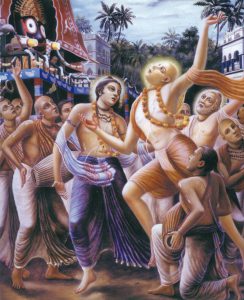 His devotees, Nṛsiṁhānanda, as the mediator. It is mentioned in Śrī Caitanya-caritāmṛta that Nṛsiṁhānanda, while here in Navadvīpa, would lose his senses and, being inspired by Mahāprabhu, would talk here about Him. Nṛsiṁhānanda would receive inspiration as though hypnotised from afar. A hypnotist can normally only hypnotise within the range of his senses, but it may sometimes be possible also that from afar one can inspire, hypnotise, and engage another as a medium. It is mentioned that Mahāprabhu did just that to Nṛsiṁhānanda Brahmacārī who was able to tell what Mahāprabhu was doing. He also foretold Mahāprabhu’s imminent arrival in Navadvīpa as well as many other things. It was all true and verified in due course of time. Such things are possible.
His devotees, Nṛsiṁhānanda, as the mediator. It is mentioned in Śrī Caitanya-caritāmṛta that Nṛsiṁhānanda, while here in Navadvīpa, would lose his senses and, being inspired by Mahāprabhu, would talk here about Him. Nṛsiṁhānanda would receive inspiration as though hypnotised from afar. A hypnotist can normally only hypnotise within the range of his senses, but it may sometimes be possible also that from afar one can inspire, hypnotise, and engage another as a medium. It is mentioned that Mahāprabhu did just that to Nṛsiṁhānanda Brahmacārī who was able to tell what Mahāprabhu was doing. He also foretold Mahāprabhu’s imminent arrival in Navadvīpa as well as many other things. It was all true and verified in due course of time. Such things are possible.
In this modern age, it is possible to communicate over long distances physically by means of radios, telephones, etc., but in earlier days this was done mentally. Mental and psychic powers previously were more developed by the yogīs and devotees. Now physically, such transmission is being achieved by scientific knowledge, and it is generally easy for people at large to believe. But in previous days, such communication was psychic, so ordinary people could not know how it was being done. We also tend to think it is impossible, even though now it is physically possible by telephone to talk with others in America and London. Such modern communication is also a miracle. Previously, the development was such that the yogīs, who may not even be devotees or connected in their practice with God, were able to develop such psychic powers that they were able to communicate on the mental plane.
etc., but in earlier days this was done mentally. Mental and psychic powers previously were more developed by the yogīs and devotees. Now physically, such transmission is being achieved by scientific knowledge, and it is generally easy for people at large to believe. But in previous days, such communication was psychic, so ordinary people could not know how it was being done. We also tend to think it is impossible, even though now it is physically possible by telephone to talk with others in America and London. Such modern communication is also a miracle. Previously, the development was such that the yogīs, who may not even be devotees or connected in their practice with God, were able to develop such psychic powers that they were able to communicate on the mental plane.
It has also been recognised in the writings of Western philosophers that it is quite possible and believable that Indian yogīs can cure diseases from a distant place. In those writings, the opinion has been given that by creating a magnetic force a disease may be cured, and also it has been considered that previously some Indian yogīs may have had the mental power to do so. And all the big Indian yogīs themselves say, and stand as proof, that so many wonderful things can be achieved only by improving psychic powers. They used to communicate with even the demigods. They were also able to go to the demigods, but only mentally, and similarly the demigods would come here. That transaction was not imaginary but was reliable and scientific.
Devotee: There is a great interest in the West in this subtle science of parapsychology.
Śrīla Bhakti Rakṣaka Śrīdhara Mahārāja: Yes. Several years ago some Russians came here to enquire amongst the Indian yogīs: “How can we understand or read things that are far away such as on the Moon, Sun, Mars, Jupiter, etc.?” They had heard that the ancient yogīs of India could do such things.
The speed of the mind is considered to be most rapid, faster even than electricity or light. This appealed to the Russians who wanted to know whether any yogīs were available who could help fulfil their material purpose: “We have sent a rocket towards Jupiter and wish to know whether by mental energy it is possible to receive information from there very quickly.”
In India, there is recognition that only the mind, and no other material thing, can be quicker than the velocity of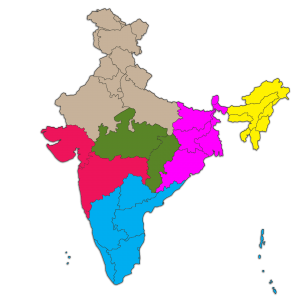 light or the electron. Manogati, mind, can hear. Despite the great distance, a far-off place can be remembered within a second. The mind is the quickest conveyance, the quickest medium. So, those Russian gentlemen came here with the enquiry: “We have come with some material object, to see if we can utilise the speed of mind in the case of scientific research.” But finally they said, “No, we could not do it. We failed. It appears that we are unable now to meet a man with such capacity here in India.”
light or the electron. Manogati, mind, can hear. Despite the great distance, a far-off place can be remembered within a second. The mind is the quickest conveyance, the quickest medium. So, those Russian gentlemen came here with the enquiry: “We have come with some material object, to see if we can utilise the speed of mind in the case of scientific research.” But finally they said, “No, we could not do it. We failed. It appears that we are unable now to meet a man with such capacity here in India.”
Once, I was delivering a lecture to an assembly of advocates. They put a question to me, “How is it that a few years ago we had a higher connection with the demigods and Satyaloka, but now we seem to have become disconnected? No god comes here although only a few years ago such things took place. Devarṣi Nārada and so many gods no longer come here, and we cannot go to them. Even in the time of the Mahābhārata, gods used to freely come here, and Arjuna and others used to go there to heaven. How has this come about?”
In reply, I explained: “The psychic powers were very much improved at that time. The power to communicate subtly was very developed scientifically, but now we have lost that capacity.”
I gave an example. Consider the present situation: the scientific civilisation has created so many wonders such as aeroplanes, buses, and rockets, but the whole world is afraid of atomic war, and if that should happen, then everything may be ruined. The whole present civilisation would be destroyed, but some books may be scattered here and there. In those books, there is much mentioned about the present-day scientific advancement, so the later generations will read that there used to be aeroplanes, buses, and so many things. But after the nuclear war, those future generations of crippled persons will not be able to understand that such things really existed. They will consider, “What is written in these books is all false, all imagination.” They will say that the scientific improvements were all imagination. Without any aeroplanes, rockets, etc. having remained, they will think, “All is bogus!”
as aeroplanes, buses, and rockets, but the whole world is afraid of atomic war, and if that should happen, then everything may be ruined. The whole present civilisation would be destroyed, but some books may be scattered here and there. In those books, there is much mentioned about the present-day scientific advancement, so the later generations will read that there used to be aeroplanes, buses, and so many things. But after the nuclear war, those future generations of crippled persons will not be able to understand that such things really existed. They will consider, “What is written in these books is all false, all imagination.” They will say that the scientific improvements were all imagination. Without any aeroplanes, rockets, etc. having remained, they will think, “All is bogus!”
Our present situation is similar. The extensive development of the mental powers that were cultured in earlier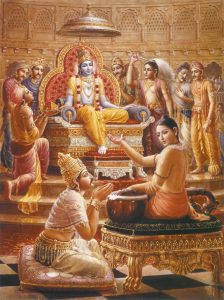 days is now no more. We have deviated from that previous position, so even if Devarṣi Nārada would come, we would not be able to see him. If Devarṣi Nārada comes here, he will not come with a physical body but with his astral body. Our minds are not sufficiently developed to be able to detect that, but if they were, we would be able to see: “Oh! Devarṣi Nārada has come.” The impression in the mind’s eye would be able to detect when such as Devarṣi, Vyāsadeva, Mahāprabhu, or Nityānanda Prabhu would come here. But that capacity has been blocked in the present age; rather, this is the age where with a microscope we can scrutinise an insect or see a virus. This is the age now!
days is now no more. We have deviated from that previous position, so even if Devarṣi Nārada would come, we would not be able to see him. If Devarṣi Nārada comes here, he will not come with a physical body but with his astral body. Our minds are not sufficiently developed to be able to detect that, but if they were, we would be able to see: “Oh! Devarṣi Nārada has come.” The impression in the mind’s eye would be able to detect when such as Devarṣi, Vyāsadeva, Mahāprabhu, or Nityānanda Prabhu would come here. But that capacity has been blocked in the present age; rather, this is the age where with a microscope we can scrutinise an insect or see a virus. This is the age now!
Devotee: Many years ago when Śrīla Svāmi Mahārāja was in the West, a lecture programme was arranged but hardly anyone attended. The devotees apologised, but Śrīla Svāmi Mahārāja said, “Well, Nārada Muni, Lord Brahmā, and many others came; I could detect that, but you were unable to see.”
Śrīla Bhakti Rakṣaka Śrīdhara Mahārāja: Just as when Śukadeva delivered Śrīmad-Bhāgavatam, his Gurus, Nārada, Vyāsadeva, Atri, Vasiṣṭha, and others all came there. Similarly, Śrīla Svāmi Mahārāja went to the West with so much earnestness to preach the doctrine of love divine, so his Gurus went there to see how He was getting on. It is not impossible.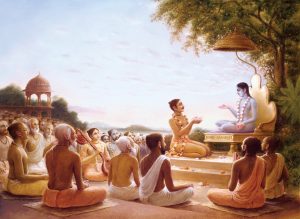
nāhaṁ tiṣṭhāmi vaikuṇṭhe
yogināṁ hṛdayeṣu vā
tatra tiṣṭhāmi nārada
yatra gāyanti mad-bhaktā
The Lord Himself says, “O Nārada, wherever My devotees sing My praises, I cannot but be present there.”
Nāhaṁ tiṣṭhāmi vaikuṇṭhe: I do not live in the transcendental plane; yogināṁ hṛdayeṣu vā: nor in the heart of a yogī; Mad-bhaktā yatra gāyanti: but wherever My devotees sing with most earnest heart; tatra tiṣṭhāmi: I present Myself there. I take My seat and hear their hearty song. Their singing and chanting carry Me from the heart of the yogī and even from the throne of My Vaikuṇṭha. I run towards the place where the devotees chant with hearty devotion about Me — that is what really attracts Me most.” Nārāyaṇa Himself says this; therefore, it is so that Nārāyaṇa and His higher devotees come to attend such assemblies.
Devotee: Can mental powers still be developed, or is it no longer possible due to the influence of Kali-yuga, the age of quarrel?
Śrīla Bhakti Rakṣaka Śrīdhara Mahārāja: It may be possible, but devotees do not like to waste their time in such affairs; they have no time to lose. They do not care to cultivate any form of mystic yoga; rather, their concentration is on service.
There is a story about a devotee who was very busily engaged and absorbed in the service of his Gurudeva. By his service, he satisfied the Lord who came in disguise and said, “Dear devotee, I am satisfied with your services. Come, I shall take you to Vaikuṇṭha.”
The devotee replied, “No, no. I have no time. My Guru Mahārāja has entrusted me with this service, so I must attend to it. I have no time to go to Vaikuṇṭha with You.” He had such attention towards his service that he could not find time even to attend to the call to go to Vaikuṇṭha.
We are to concentrate on our duty given by Gurudeva and shall have no time to spare to go to Vaikuṇṭha to fulfil our curiosity. Such sort of exclusive attention is laudable and necessary for the devotee. If the master says to his servant, “You have laboured a long time; now you are tired. Come and take your food.” The dutiful servant may reply, “No, no, my master, I have no time. I must finish this, and then I shall go to take food.” Such dealings are not impossible. Similarly, a faithful worker on being called by his master to stop work and take rest may reply, “No, no I have no time to take rest now. I shall finish this, then I shall take rest.” This is responsibility in service.
Another example is found in the service of Mother Yaśodā. She was boiling milk for young Kṛṣṇa, Gopāla. He was engaged in sucking Mother Yaśodā’s breast while nearby some milk was being heated in a pot. Suddenly, the milk came to a boil and overflowed into the fire. Immediately, Yaśodā forcibly took Gopāla from her lap and went to take care of the milk.
Naturally, Kṛṣṇa became dissatisfied to be snatched away from His mother’s breast. So, it may apparently seem that Mother Yaśodā is committing an error: that she interrupted Kṛṣṇa’s immediate satisfaction of sucking her breast by forcibly putting him to one side to go to save the overflowing milk, which may or may not be going to be directly utilised for Him. But this is an extreme example to show how much care and attention must be paid to save and protect the materials to be used in the service of Kṛṣṇa, even if that should make Him dissatisfied for the time being.
that Mother Yaśodā is committing an error: that she interrupted Kṛṣṇa’s immediate satisfaction of sucking her breast by forcibly putting him to one side to go to save the overflowing milk, which may or may not be going to be directly utilised for Him. But this is an extreme example to show how much care and attention must be paid to save and protect the materials to be used in the service of Kṛṣṇa, even if that should make Him dissatisfied for the time being.
Everything is meant for Kṛṣṇa, so we must preserve and take care of everything. “For the time being, Kṛṣṇa may be a little dissatisfied, but what does it matter? I need to look after His service materials.” That should be our tendency, and it is a very fine, very subtle thing to detect and understand. What is the underlying tendency? We must have the mood that everything belongs to Kṛṣṇa, and at the cost of the present, the future must be kept up. “At present, we may suffer, but we must still store for our future.” When this sort of tendency is in the interest of Kṛṣṇa, it is to be appreciated. So, we are to engage in jñāna-śunya-bhakti — service with no mood of curiosity. It is not that we shall want to be a big word-juggler, yogī, jnāni, or any type of ‘big’ person. But we shall feel satisfied if we have the chance to lead even a half-educated forest life, but as humble servants of the gopīs. Such humility — and not grandeur — satisfies Kṛṣṇa most. Grandeur may be adored in Vaikuṇṭha, but it is ignored in Vṛndāvana-dhāma. The Vṛndāvana Pastimes are simple, plain, and ordinary — neither high nor low — but a golden average. The degree of meanness can be infinite. The degree of nobleness and grandness can also be infinite. But the middle point, we may say, is the golden mean. Love is there. Love does not want to see into the future, but only the present — the concentrated present. Love. For love, we may risk the whole future and may not care at all about the past. “Act. Act in the living present.” Grandness and reverence are not very suitable for love. We are to think that a plain life is the highest position for the transaction of love, whereas grandeur disturbs us in our transaction of true love.
Kṛṣṇa, it is to be appreciated. So, we are to engage in jñāna-śunya-bhakti — service with no mood of curiosity. It is not that we shall want to be a big word-juggler, yogī, jnāni, or any type of ‘big’ person. But we shall feel satisfied if we have the chance to lead even a half-educated forest life, but as humble servants of the gopīs. Such humility — and not grandeur — satisfies Kṛṣṇa most. Grandeur may be adored in Vaikuṇṭha, but it is ignored in Vṛndāvana-dhāma. The Vṛndāvana Pastimes are simple, plain, and ordinary — neither high nor low — but a golden average. The degree of meanness can be infinite. The degree of nobleness and grandness can also be infinite. But the middle point, we may say, is the golden mean. Love is there. Love does not want to see into the future, but only the present — the concentrated present. Love. For love, we may risk the whole future and may not care at all about the past. “Act. Act in the living present.” Grandness and reverence are not very suitable for love. We are to think that a plain life is the highest position for the transaction of love, whereas grandeur disturbs us in our transaction of true love.
Image/Art made possible by Pixabay.com & Krishnapath.org








